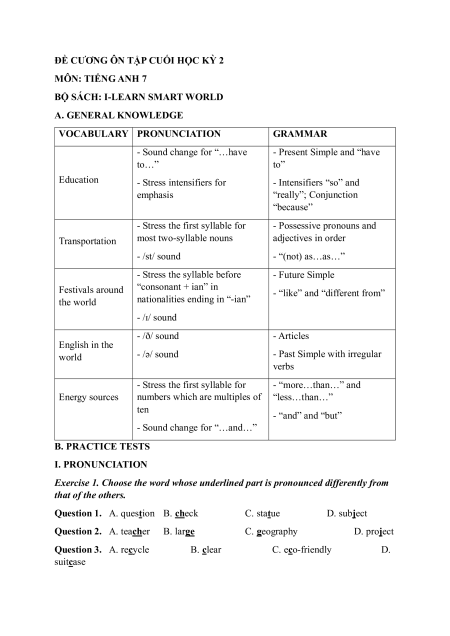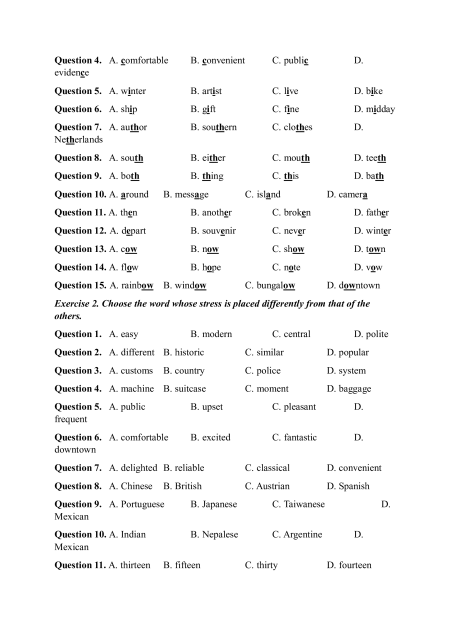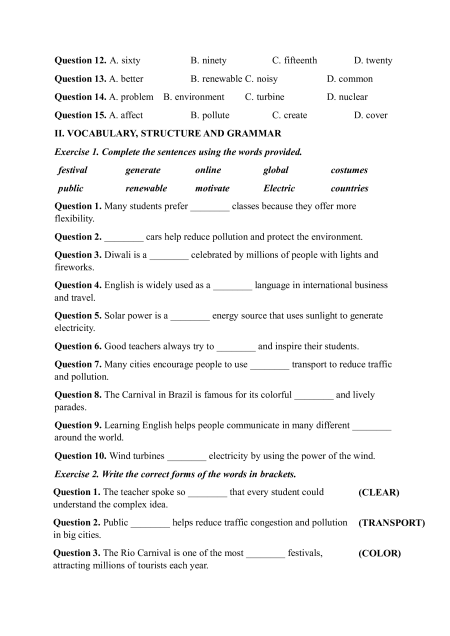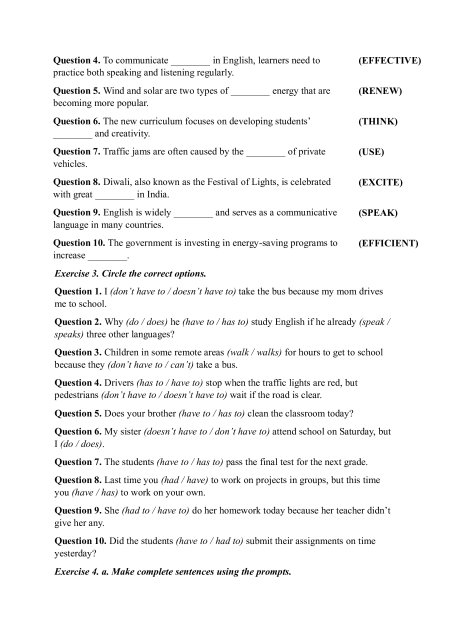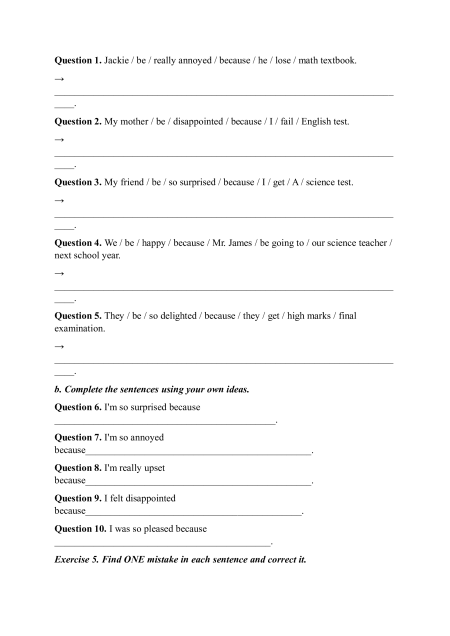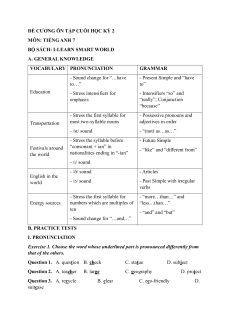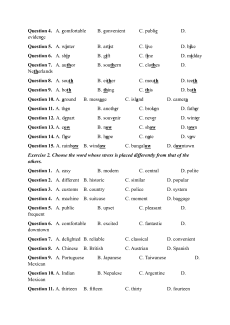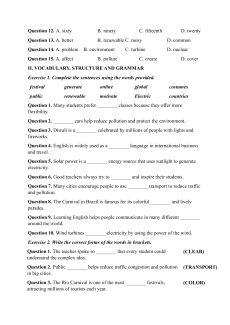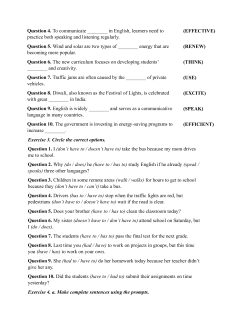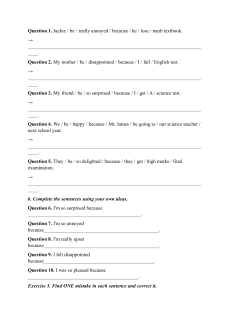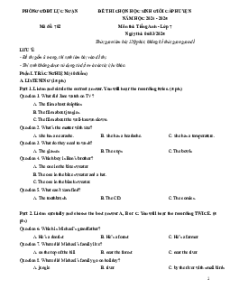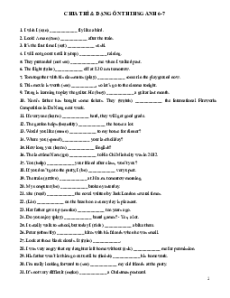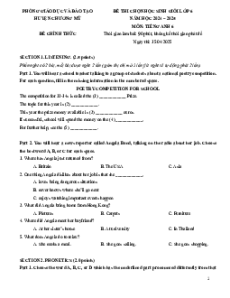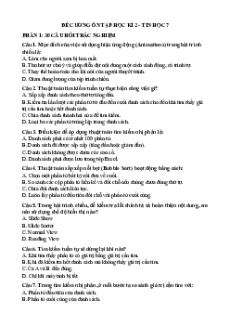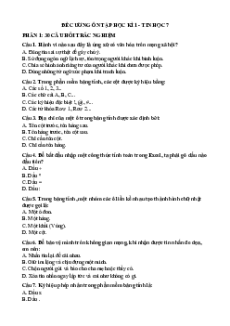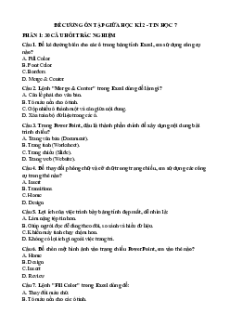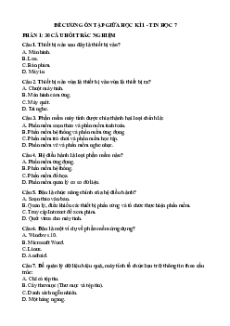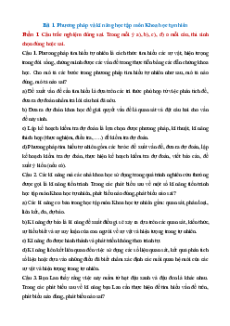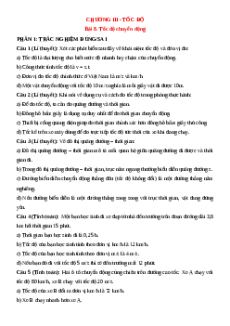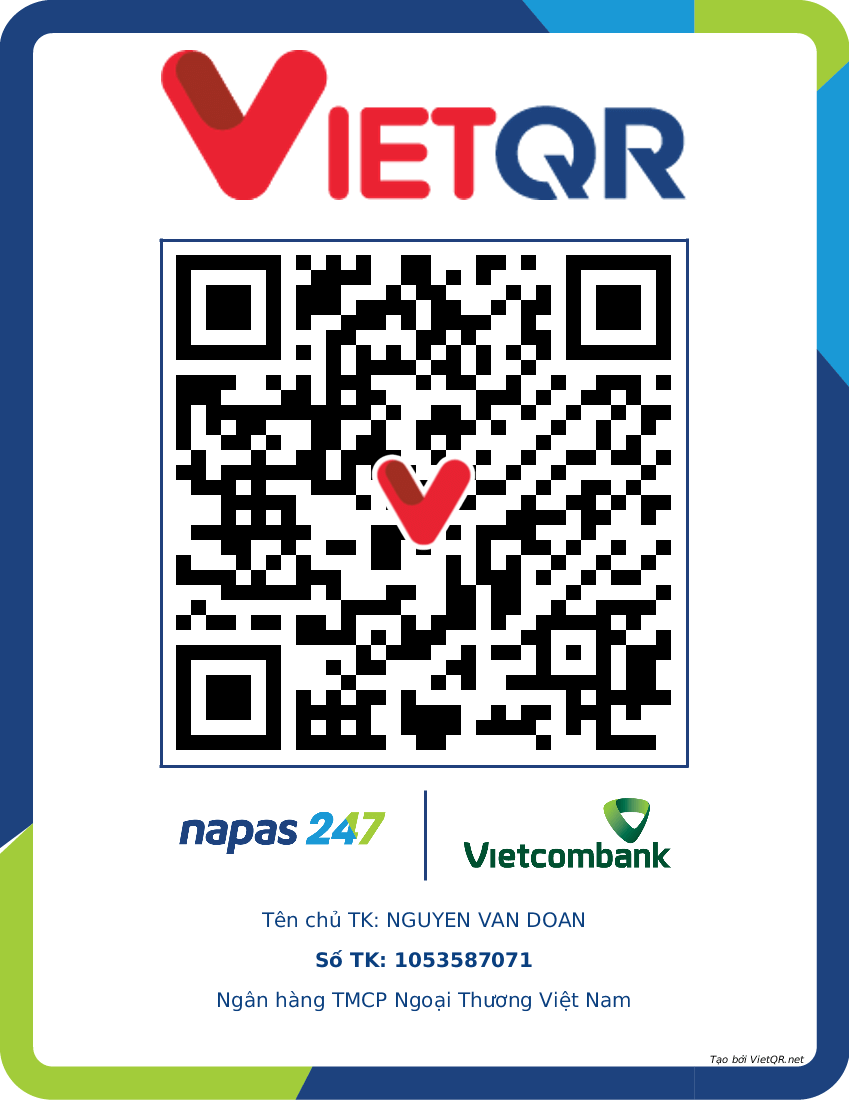ĐỀ CƯƠNG ÔN TẬP CUỐI HỌC KỲ 2 MÔN: TIẾNG ANH 7
BỘ SÁCH: I-LEARN SMART WORLD A. GENERAL KNOWLEDGE
VOCABULARY PRONUNCIATION GRAMMAR - Sound change for “…have - Present Simple and “have to…” to” Education - Stress intensifiers for - Intensifiers “so” and emphasis “really”; Conjunction “because”
- Stress the first syllable for - Possessive pronouns and Transportation most two-syllable nouns adjectives in order - /st/ sound - “(not) as…as…” - Stress the syllable before - Future Simple Festivals around “consonant + ian” in
- “like” and “different from” the world
nationalities ending in “-ian” - /ɪ/ sound - /ð/ sound - Articles English in the world - /ə/ sound - Past Simple with irregular verbs
- Stress the first syllable for - “more…than…” and Energy sources
numbers which are multiples of “less…than…” ten - “and” and “but”
- Sound change for “…and…” B. PRACTICE TESTS I. PRONUNCIATION
Exercise 1. Choose the word whose underlined part is pronounced differently from that of the others.
Question 1. A. question B. check C. statue D. subject
Question 2. A. teacher B. large C. geography D. project
Question 3. A. recycle B. clear C. eco-friendly D. suitcase
Question 4. A. comfortable B. convenient C. public D. evidence
Question 5. A. winter B. artist C. live D. bike
Question 6. A. ship B. gift C. fine D. midday
Question 7. A. author B. southern C. clothes D. Netherlands
Question 8. A. south B. either C. mouth D. teeth
Question 9. A. both B. thing C. this D. bath
Question 10. A. around B. message C. island D. camera
Question 11. A. then B. another C. broken D. father
Question 12. A. depart B. souvenir C. never D. winter
Question 13. A. cow B. now C. show D. town
Question 14. A. flow B. hope C. note D. vow
Question 15. A. rainbow B. window C. bungalow D. downtown
Exercise 2. Choose the word whose stress is placed differently from that of the others. Question 1. A. easy B. modern C. central D. polite
Question 2. A. different B. historic C. similar D. popular
Question 3. A. customs B. country C. police D. system
Question 4. A. machine B. suitcase C. moment D. baggage Question 5. A. public B. upset C. pleasant D. frequent
Question 6. A. comfortable B. excited C. fantastic D. downtown
Question 7. A. delighted B. reliable C. classical D. convenient
Question 8. A. Chinese B. British C. Austrian D. Spanish
Question 9. A. Portuguese B. Japanese C. Taiwanese D. Mexican Question 10. A. Indian B. Nepalese C. Argentine D. Mexican
Question 11. A. thirteen B. fifteen C. thirty D. fourteen Question 12. A. sixty B. ninety C. fifteenth D. twenty Question 13. A. better B. renewable C. noisy D. common
Question 14. A. problem B. environment C. turbine D. nuclear Question 15. A. affect B. pollute C. create D. cover
II. VOCABULARY, STRUCTURE AND GRAMMAR
Exercise 1. Complete the sentences using the words provided. festival generate online global costumes public renewable motivate Electric countries
Question 1. Many students prefer ________ classes because they offer more flexibility.
Question 2. ________ cars help reduce pollution and protect the environment.
Question 3. Diwali is a ________ celebrated by millions of people with lights and fireworks.
Question 4. English is widely used as a ________ language in international business and travel.
Question 5. Solar power is a ________ energy source that uses sunlight to generate electricity.
Question 6. Good teachers always try to ________ and inspire their students.
Question 7. Many cities encourage people to use ________ transport to reduce traffic and pollution.
Question 8. The Carnival in Brazil is famous for its colorful ________ and lively parades.
Question 9. Learning English helps people communicate in many different ________ around the world.
Question 10. Wind turbines ________ electricity by using the power of the wind.
Exercise 2. Write the correct forms of the words in brackets.
Question 1. The teacher spoke so ________ that every student could (CLEAR) understand the complex idea.
Question 2. Public ________ helps reduce traffic congestion and pollution (TRANSPORT) in big cities.
Question 3. The Rio Carnival is one of the most ________ festivals, (COLOR)
attracting millions of tourists each year.
Question 4. To communicate ________ in English, learners need to (EFFECTIVE)
practice both speaking and listening regularly.
Question 5. Wind and solar are two types of ________ energy that are (RENEW) becoming more popular.
Question 6. The new curriculum focuses on developing students’ (THINK) ________ and creativity.
Question 7. Traffic jams are often caused by the ________ of private (USE) vehicles.
Question 8. Diwali, also known as the Festival of Lights, is celebrated (EXCITE) with great ________ in India.
Question 9. English is widely ________ and serves as a communicative (SPEAK) language in many countries.
Question 10. The government is investing in energy-saving programs to (EFFICIENT) increase ________.
Exercise 3. Circle the correct options.
Question 1. I (don’t have to / doesn’t have to) take the bus because my mom drives me to school.
Question 2. Why (do / does) he (have to / has to) study English if he already (speak /
speaks) three other languages?
Question 3. Children in some remote areas (walk / walks) for hours to get to school
because they (don’t have to / can’t) take a bus.
Question 4. Drivers (has to / have to) stop when the traffic lights are red, but
pedestrians (don’t have to / doesn’t have to) wait if the road is clear.
Question 5. Does your brother (have to / has to) clean the classroom today?
Question 6. My sister (doesn’t have to / don’t have to) attend school on Saturday, but I (do / does).
Question 7. The students (have to / has to) pass the final test for the next grade.
Question 8. Last time you (had / have) to work on projects in groups, but this time
you (have / has) to work on your own.
Question 9. She (had to / have to) do her homework today because her teacher didn’t give her any.
Question 10. Did the students (have to / had to) submit their assignments on time yesterday?
Exercise 4. a. Make complete sentences using the prompts.
Đề cương ôn tập Cuối kì 2 Tiếng Anh 7 ilearn Smart world
257
129 lượt tải
80.000 ₫
MUA NGAY ĐỂ XEM TOÀN BỘ TÀI LIỆU
CÁCH MUA:
- B1: Gửi phí vào TK:
1133836868- CT TNHH DAU TU VA DV GD VIETJACK - Ngân hàng MB (QR) - B2: Nhắn tin tới Zalo VietJack Official ( nhấn vào đây ) để xác nhận thanh toán và tải tài liệu - giáo án
Liên hệ ngay Hotline hỗ trợ: 084 283 45 85
Chúng tôi đảm bảo đủ số lượng đề đã cam kết hoặc có thể nhiều hơn, tất cả có BẢN WORD, LỜI GIẢI CHI TIẾT và tải về dễ dàng.
Để tải tài liệu gốc về máy bạn click vào nút Tải Xuống ở trên!
- Tailieugiaovien.com.vn giới thiệu bộ Đề cương ôn tập Cuối kì 2 gồm: Đề cương và 2 đề thi Học kì 2 ilearn Smart World 7 có file nghe Tiếng anh 7 mới nhất nhằm giúp Giáo viên có thêm tài liệu tham khảo ra đề thi Tiếng anh lớp 7.
- File word có lời giải chi tiết 100%.
- Mua trọn bộ sẽ tiết kiệm hơn tải lẻ 50%.
Đánh giá
4.6 / 5(257 )5
4
3
2
1
Trọng Bình
Tài liệu hay
Giúp ích cho tôi rất nhiều
Duy Trần
Tài liệu chuẩn
Rất thích tài liệu bên VJ soạn (bám sát chương trình dạy)
